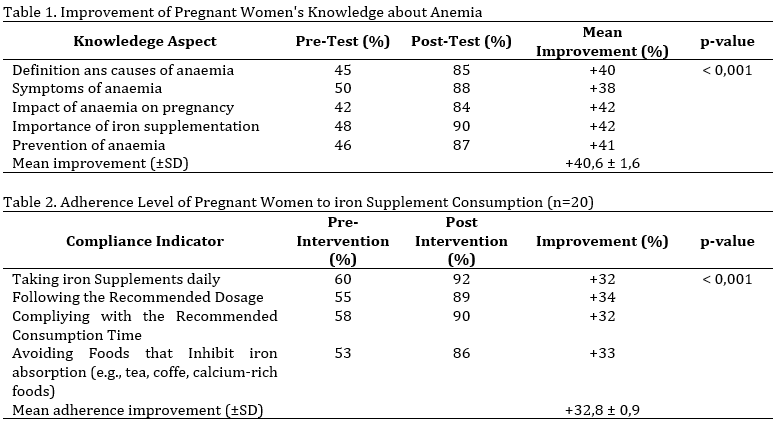PREGNANCY ANEMIA EDUCATION AND MONITORING PROGRAM IN BANDUNGREJOSARI URBAN VILLAGE

Downloads
Introduction: Anaemia in pregnancy is a major public health issue linked to adverse maternal and neonatal outcomes, particularly in developing countries. In Bandungrejosari Village, Malang City, anaemia affects about 35% of pregnant women. This program aimed to implement community-based education and monitoring programme in improving knowledge, adherence to iron supplementation, and haemoglobin levels.
Methods: Community service was conducted with 20 pregnant women purposively selected from Puskesmas Janti. Eligible participants had a gestational age of ≥12 weeks and no haematological disorders. Data were collected using validated questionnaires on knowledge and adherence, and haemoglobin levels were measured using a portable hemoglobinometer. Statistical analysis employed paired t-tests and chi-square tests with a significance level of p < 0.05.
Results: The program significantly improved knowledge levels, with mean increases ranging from 38% to 42% (p < 0.001). Adherence to iron supplementation rose from 57% to 90%, while the prevalence of anaemia decreased from 35% to 18%. The mean haemoglobin concentration increased from 10.5 ± 0.8 g/dL to 12.2 ± 0.7 g/dL (p < 0.001).
Conclusion: The findings demonstrate that a community-based anaemia education and monitoring programme can effectively enhance knowledge, adherence to supplementation, and haemoglobin status among pregnant women. The authors declare no potential conflict of interest in conducting this study.

This work is licensed under a Creative Commons Attribution 4.0 International License.
Authors who publish with Jurnal Pengabdian Masyarakat dalam Kesehatan agree to the following terms:
The journal allows the author to hold the copyright of the article without restrictions.
The journal allows the author(s) to retain publishing rights without restrictions
The legal formal aspect of journal publication accessibility refers to Creative Commons Attribution (CC BY).
Authors retain copyright and grant Jurnal Pengabdian Masyarakat dalam Kesehatan the right of first publication with the work simultaneously licensed under a Creative Commons Attribution 4.0 International License that allows others to remix, adapt and build upon the work with an acknowledgment of the work's authorship and of the initial publication in Jurnal Pengabdian Masyarakat dalam Kesehatan.
- Authors are permitted to copy and redistribute the journal's published version of the work (e.g., post it to an institutional repository or publish it in a book), with an acknowledgment of its initial publication in Jurnal Pengabdian Masyarakat dalam Kesehatan.
Jurnal Pengabdian Masyarakat dalam Kesehatan requires a formal written declaration and transfer of copyright from the author(s) for each article published. We, therefore, ask you to complete and return this form, retaining a copy for your own records. Your cooperation is essential and appreciated. Any delay will result in a delay in publication.

JPMK by Unair is licensed under a Creative Commons Attribution 4.0 International License.










